That Famous Place
Riding the wayback machine to a piece I wrote about the Dixon Bar
Boozhoo! Aaniin! Welcome to another edition of An Irritable Métis. The following is an article I wrote for Montana Quarterly way back in 2016. It was actually the first piece I ever did for them. I am re-posting it here for two reasons. First, it has some good Montana flavor, in my opinion, and given that MQ doesn’t have an online presence to speak of I think it deserves more readers. And secondly, as I’m trying to finish up this next round of edits of Becoming Little Shell over the next few weeks I need post fodder. This is some of that! I enjoyed revisiting the piece and found it difficult not to edit because there are things I’d probably say differently. Oh, well. What you are reading was scanned right out of the magazine and I didn’t change anything. I even included some of the photos (which I took) and their accompanying captions. I hope you like it!
As always, if you forgot what all this is even about, or you’re new here, whatever, you may refresh your memory here. If you want to help keep a writer out of hard labor, well….
So without further ado….
Put on the literary map by poets, the Dixon Bar retains a cantankerous nostalgia for an older Montana
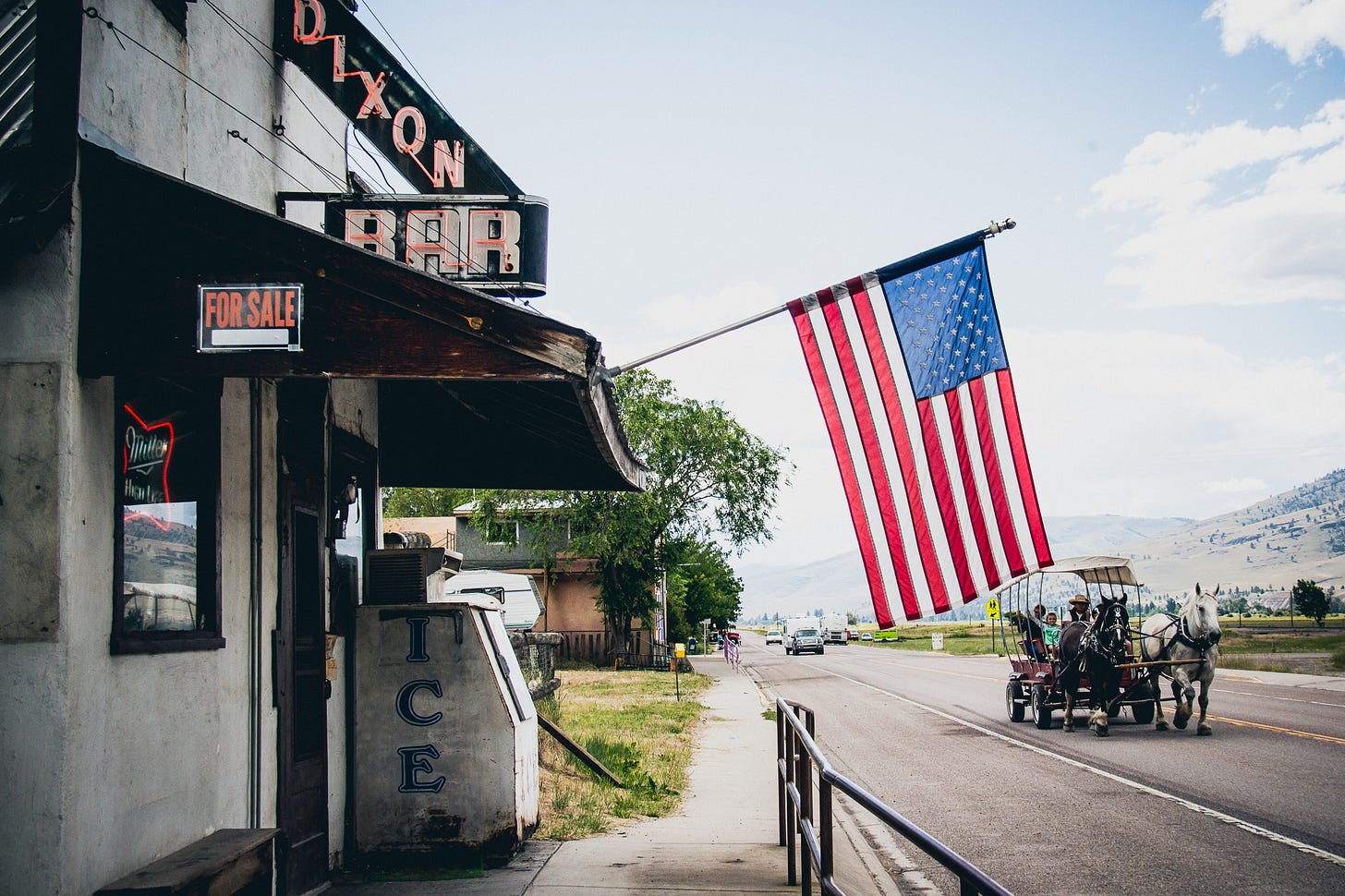
YOU’LL NEED TO KEEP YOUR EYES OPEN TO FIND THE DIXON BAR WHEN YOU PASS through its namesake town on Highway 200 in western Montana. If you don’t spot the small sign or if you somehow miss the neon beer signs in the windows, you'll blow right by. The building is nondescript and a bit ramshackle, and with its “For Sale” signs prominently displayed, you might not think the place is even open. But it still does business. In certain circles the place retains a gritty fame, or infamy, that has been attracting a specific kind of pilgrim to the southern banks of the Flathead River for more than 40 years.
I'm imagining a particular history myself as I stomp across the threshold of the place and squint into dim light cast over a wildly cluttered backbar along the left wall of the room. September blusters outside and the gunmetal clouds and wind send rain seemingly in all directions at once. In the opposite corner of the tiny barroom – past a sewing machine, a couple saddles, a wheelchair under a blanket – huddles an old wood stove. It brings to mind dark afternoons and nights during winters past, wind and snow howling, when that stove and the bartender were the only thing keeping the cold at bay for many of the town's residents and passers-by. At least the sociable ones, or those most committed to drink.
For owner Bud Schmauch, those scenes aren’t imaginings, they're memory. The bar has been in his family since 1951, when his mother and father – Joanne and Richard “Tiger” Schmauch – took over the place. Bud, a third-generation Montanan born in Butte, was seven. His mother was behind the bar for 52 years, right up until three days before she died in 2002 at the age of 80. It’s those older days in Dixon that I first ask Bud about.
“Probably about the same number of people in town, but the living conditions were different,” Schmauch says. “Everyone had a well in their backyard, and an outhouse. You didn't have city this, or city that. So you pumped your own water. And there was a ditch, an irrigation ditch, that run through town. Everybody had a bridge to cross the ditch to their house.”
He pauses to demand chocolate, and his wife of two years – her name is Joanne, too, and just like his mother she's a redhead – brings him a candy bar. “The river was used for subsistence,” Schmauch says. “Huntin’. Fishin’. Trappin’. That kind of stuff. It wasn't the luxury thing that it is today. Of course there was a bridge there at that time too. The tribe took that out. They didn’t want anybody over there so they took it out. Which, who cares, it's their bridge. It was a better lifestyle then, it was before drugs. The drug culture has ruined everything. It's terrible. There's no work ethic, there's nothing.”
THE FIRST TIME I VISITED THE DIXON BAR WAS ONLY A COUPLE MONTHS PRIOR. That time there were maybe half-a-dozen other folks on hand, chatting each other up. Many of them, Joanne Schmauch included, were also smoking, illegal [in bars] in Montana since 2009. When the lone other patron of the bar this afternoon shakes out an American Spirit and prepares to light up, Joanne shakes her head and gestures.
“We have to go outside,” she says. “Bud just quit smoking last week.” With a wink at me and a stage whisper in Bud's direction, she concludes, “And he's really cranky.”
BUD AND I ARE ALONE IN THE BAR. I want a story, something dangerous from back in Dixon’s day. Something wild, something that reads well. Schmauch isn't particularly forthcoming.
“A story?” he says, almost in a sneer.
“Yeah,” I say. “What's the craziest thing you've ever seen happen in here? Has anyone ever come in here waving guns or knives or anything?”
Schmauch's eyes go wide. “You think?” he says. He reaches around his hip and draws, then slams down on the bar, what looks to me to be a .38 pistol. “You think people come in here with an effing gun? Huh?”
I'm a little alarmed. Not because I'm afraid of guns, but because I hadn't even noticed he was carrying one. In defense of my own eyesight, I will say that Schmauch is wearing a long western shirt, untucked. He's spinning the pistol slowly on the bar, his finger looped in the trigger guard. He leans back on his stool and looks me in the eye. “Everybody knows I carry a gun,” he says. “They're not gonna contest me.”
My tension is eased when the Schmauch's cat, a pretty Siamese named Polar Bear, hops up on the bar. Bud strokes her back a couple times and quips, “If we ever have to leave the bar,” he says, a wry grin twisting his lips, “we like to say we leave the oriental girl in charge."
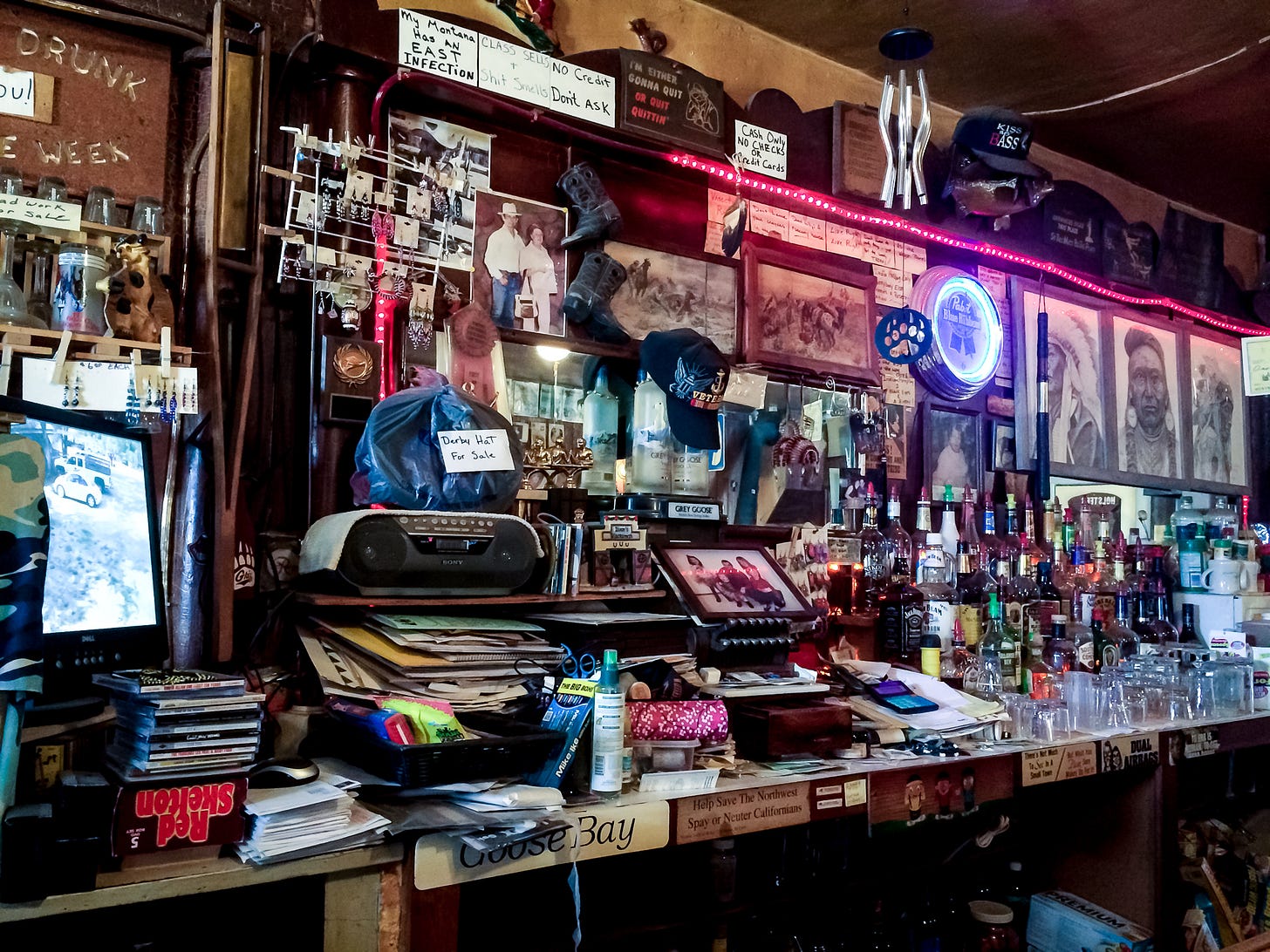
WHAT ORIGINALLY BROUGHT ME TO THE DIXON BAR was curiosity born from the same incident that has brought so many here before me, and Schmauch knows it. “I suppose you're waiting to ask me about the three stooges,” he says. He's right.
The general backstory – and by now it's difficult to separate the truth from the apocryphal – is this. In 1970, poets Richard Hugo, James Welch and J.D. Reed stopped in the bar after a day fishing on the river. Hugo was something of a regular. As the drinking continued, the three decided they would each write a poem called “The Only Bar in Dixon.” Which they did, and on October 10, 1970, all three were published in the New Yorker magazine. That feat alone is astounding, but it was the content of the poems that lit some fuses in Dixon. Racist toward Indians, it was thought, and denigrating of the town itself. As for the subject bar's proprietor, Welch wrote, “Take the redhead – yours for just a word.” This didn't sit well with “the redhead,” Schmauch's mother, who wrote a scathing letter to the Missoulian that Hugo then responded to with no show of remorse. In some ways, it created a touchstone that Hugo wrote about several times subsequently, in how poets and poetry relate to their surroundings, truthfully or otherwise.
I ask Schmauch for his side, his version, of the story.
“You want a version, or do you want the truth?” he says. “It's not a story, it's the truth. I'm the only one here that can verify anything. And there’s nobody here that's gonna call me a liar.”
Did it change things in Dixon?
“Do you think they had that much influence?” Schmauch says. “Who cares about the effing New Yorker? They were egomaniacs. They were drunks. Three of the worst I've ever seen. Arrogant. Rude. Dirty. Physically dirty. No class. Absolutely no class.”
Finally, do people still come from all over the country to visit the bar?
“Not so much anymore. They know how I feel about it,” Schmauch says.
The publishing of the three New Yorker poems, and the aftermath, have created a curious relationship between the bar and Richard Hugo. I don't doubt for an instant the legitimacy of Schmauch's bitterness toward Hugo and the poems. But even as he argues that the incident changed nothing in Dixon, there's no doubt Hugo and company brought decades of patrons and curiosity seekers who otherwise never would have heard of Dixon the town, let alone its “only” bar (there's now a second one just down the street). A display featuring the poems hangs on the wall. With pride Joanne produces an internet printout showing that, in 2005, the Academy of American Poets designated the bar as one of 31 National Poetry Landmarks. Most of these sites are the homes or birthplaces of famous poets such as Emily Dickinson and Walt Whitman, or cultural landmarks like City Lights Bookstore in San Francisco. But, right there at number 20, is the Dixon Bar, Dixon, Montana.
BUD SCHMAUCH IS OLD-SCHOOL MONTANAN. Ornery and short-tempered. Not a politically correct bone in his body. He is a self-described patriotic veteran, even though he blames the VA for failure to treat health problems caused by Agent Orange during three tours in Vietnam. He supported Donald Trump because he doesn't believe Hillary Clinton is “a patriot.” He is a lot of what I am not. Yet, I enjoy speaking with him and hearing his stories, and if you are respectful he will fill your ear with them. When it's time to leave, he offers hope that I come back, that I’m “welcome as the flowers in spring.” Few bars of such atmosphere – where one chuckles at the general offensiveness of the hand-printed signs adorning the walls and accepts them as such or simply leaves – remain in Montana. And I do plan to return.
Back to that famous bar in Dixon.
Here’s the picture of the poems hanging on the wall. You can read them HERE along with a Missoulian take on the story.

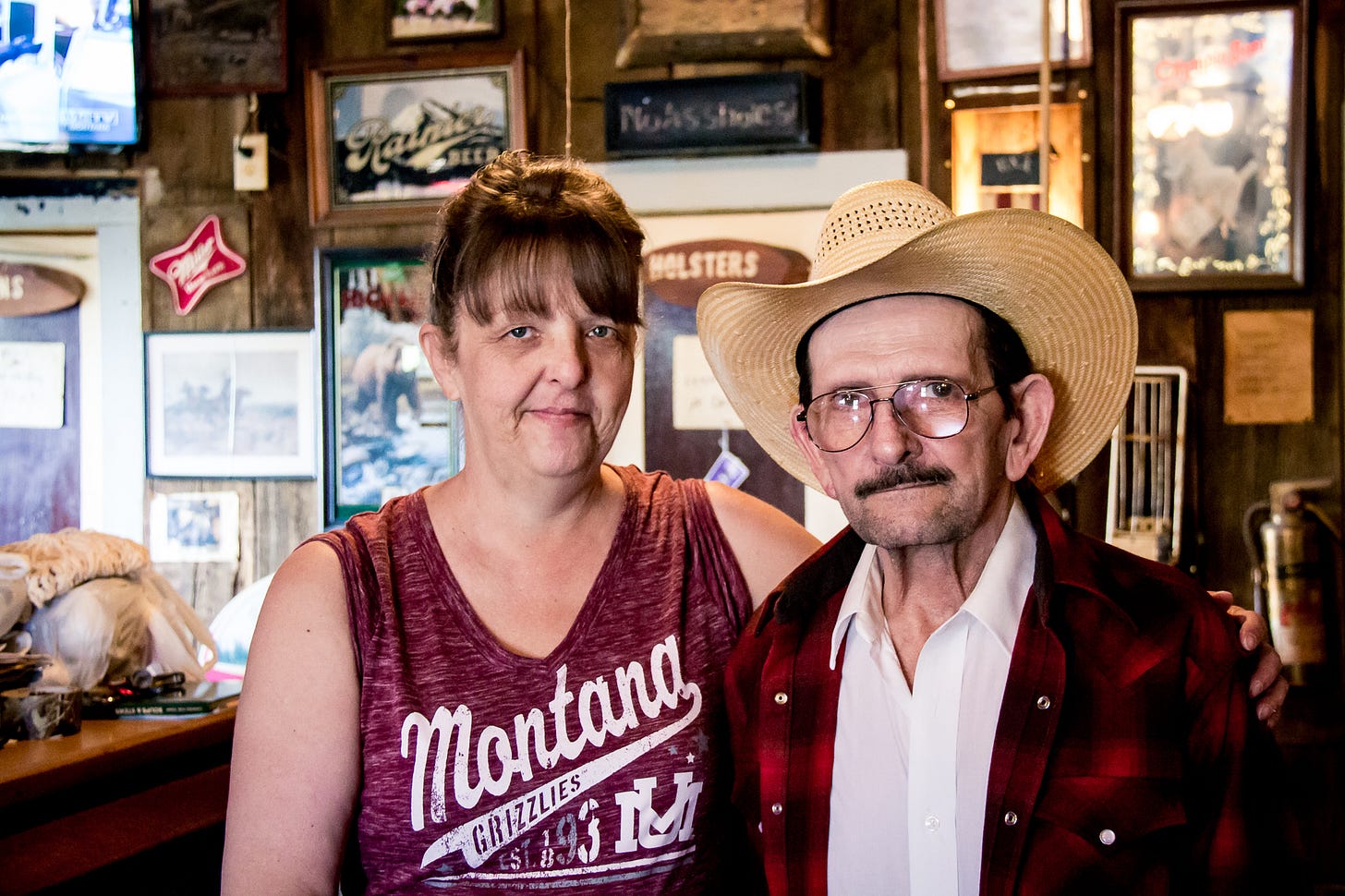
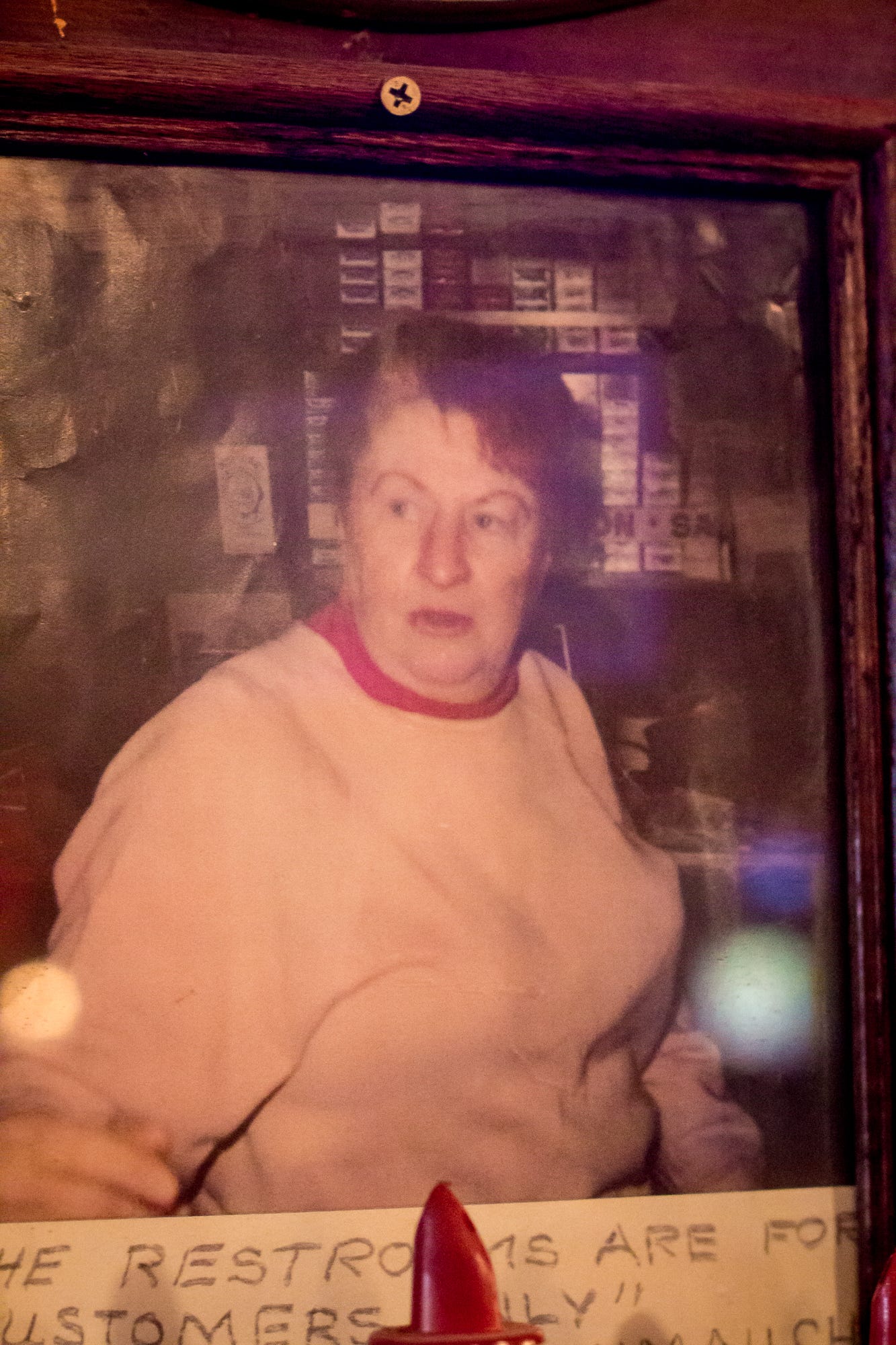
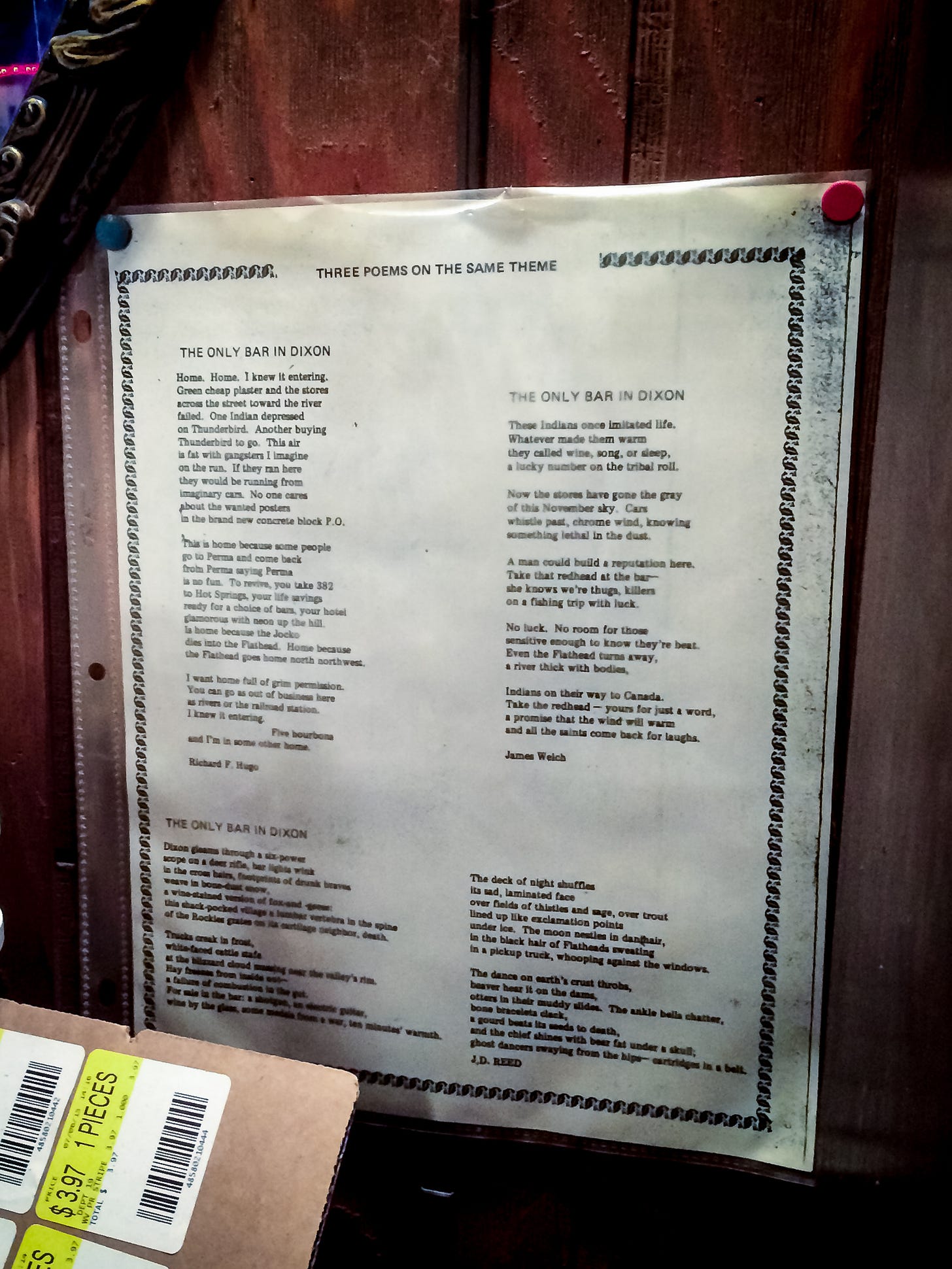
“When asked if he’d actually sell the place, his answer is a robust “Heck yes!” 🤣🤣🤣🤣👏🏻👏🏻👏🏻👏🏻👏🏻👏🏻👏🏻
Chris! Hello! I am amazed and thrilled that I happened upon your newsletter and this particular post! I am from Dixon (Dixon was last home base when living in MT years ago, family still there, yada yada, anyway, which can explain my feeling amazed!), a new writer on Substack, and I am, as I type, doing a Featured Writer piece on Hugo, Welch and a couple of others. I actually found this post in a google search of the Dixon Bar-- out of curiosity and wondering if there were any other poets who have penned poems about it. Well, currently I am here and discovering that you are the current Montana Poet Laureate! Congratulations on that honor! I look forward to reading your work! Thus far, I have read this piece. What an article and what an encounter with Bud! He is and always has been a 'pistol'! I hold a slew of memories of the Dixon Bar, Joanne (Bud's mom), and Bud, but I won't get into any of that here! Just wanted to say hello and relay the smile that this piece brought me. Thanks so much! ~Wendy